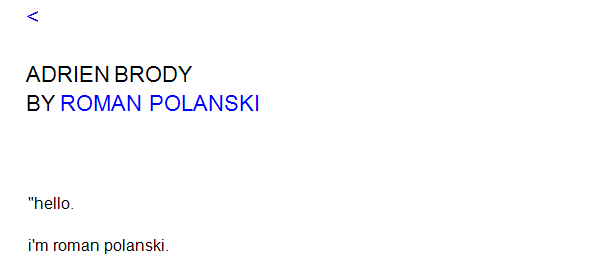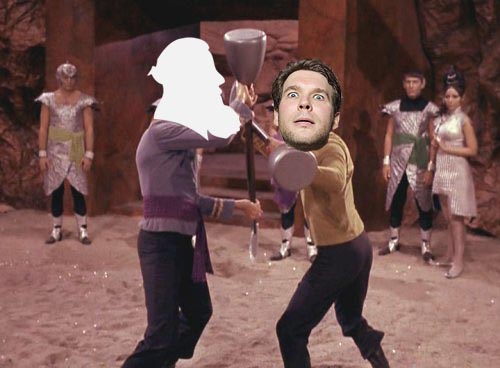 Nate Slawson is the author of Panic Attack, USA (YesYes, Fall 2011) and two chapbooks, The Tiny Jukebox (H_NGM_N Books) and A Mixtape Called Zooey Deschanel (Line4). Recent work has appeared or is forthcoming in Diode, Handsome, alice blue, Slope, Cannibal, horse less review, Corduroy Mtn., Forklift Ohio, DIAGRAM, Typo, and other places. He lives in Chicago where he teaches and runs cinematheque, an indie press that publishes chapbooks of poetry and prose.
Nate Slawson is the author of Panic Attack, USA (YesYes, Fall 2011) and two chapbooks, The Tiny Jukebox (H_NGM_N Books) and A Mixtape Called Zooey Deschanel (Line4). Recent work has appeared or is forthcoming in Diode, Handsome, alice blue, Slope, Cannibal, horse less review, Corduroy Mtn., Forklift Ohio, DIAGRAM, Typo, and other places. He lives in Chicago where he teaches and runs cinematheque, an indie press that publishes chapbooks of poetry and prose.
I recently corresponded with Slawson about his new book from YesYes, Panic Attack, USA, but as with any great conversation, our subject matter ran the gamut from basketball to Neutral Milk Hotel—sort of like the book itself with its strange and penetrating imagery, its tide-like rhythm-making, its obsessions, its pop culture memories. I pushed Slawson to talk about his poems in uncomfortable ways (for any poet), and he engaged—and set me straight a few times. And then we talked about good, old-fashioned poetics. Slawson felt like my pen pal for a week or so. Below is our conversation in its entirety–unedited. It felt like the thing to do.
AO: Talk to me about the first section of Panic Attack, USA, The Teenage Sonnets. There’s an American tradition of reducing the sonnet form to its most basic constituent part: 14 lines. What’s the significance, for you, in writing the American sonnet?
SLAWSON: Sonnets are rad. The first poems I ever wrote were sonnets, proper iambic, rhyme-schemed sonnets. And I thought they were fun to math. It was kind of like doing math, kind of like a word problem where the train from Poughkeepsie needs to arrive in Baltimore at 6:22 pm with its 140 passengers. But as I read more poems, stumbled upon more poets (my partial travels, chronologically: O’Hara, Lowell, Dickinson, Berryman, Stevens, Natasha Trethewey, Donald Justice), I was enthralled by how form was used. For a young (read: halfwitted) student/writer, there’s something remarkably badass and American about making an established form into something else but still calling that form the form.
AO: I wrote a lot of sonnets early on too. I was writing these intricate things about snails and kids smoking in the streets and, well, my neighborhood in L.A. Eventually, these sonnets got torn apart and recycled into other poems, some of which found their way into my first book. Do you think part of being an American poet is learning how to dismantle (tradition, form)?
NS: I kind of want to read those early Alexis Orgera sonnets. And by kind of, I mean very very. [Nate: I just looked for those old sonnets. They are gone, gone, gone.] A part of me feels I’m always trying to re-write my own version of “Where You’ll Find Me Now” (from Neutral Milk Hotel’s On Avery Island). With the “tear into me” and the “kids in their cars cigarette smoking.” And yeah, I think learning how to dismantle is essential part of being an American poet (all the awesome poets do it). And learning tradition and learning form are the constant, the must. That comes first. We come to form and tradition through different experiences—books, teachers, friends—and proceed with whatever steam our mind-wheels generate.
AO: The Teenage Sonnets, again, as the first section of the book, set into motion the trajectory of the book: grappling with violent obsession, taking road trips, and recalling all kinds of musical influence. Could you talk a little about how these moments inform Panic Attack, USA?
NS: I look at this section as the clumsy (narrative trajectory-wise) introduction to what happens in the rest of the book. Along with the idea of TEENAGE sonnets being scattered and earnest and obsessive and trying so damn hard to convince “you” to show “me” your non-matching underwear.
AO: I would really love it if you’d talk more about the book’s trajectory. If the Teenage Sonnets are the most “earnest,” maybe in terms of teenage naivete, have you written a coming-of-age story that perhaps widens both the world and the heart? Maybe it’s not fair to ask you as the writer. Maybe that’s the job of the reader, but I’m always curious about what the writer sees.
NS: I don’t think I’m smart or skilled enough to write a coming-of-age story. I mean, I hope there’s some of that happening in the book—as the heart explodes it covers the world in its beautiful heart explosion. And that is, in some way, how I wanted the book’s quasi-narrative to function. But it was never all-consuming or mapped out. If you or another reader see a/the story, rad.
AO: In terms of micro-story (vs. meta-narrative), in regard to individual poems I’m very interested in your line breaks. I like the surprise I feel line by line, particularly in the shorter-lined poems. For instance, in “You Are a Saxophone,” you break on articles and prepositions in a way that creates a neat rhythm. You write, “a pain in your heart / sprung from the / blues & which / when I cup my / hand to your chest / be like thunderous / rain like wasps in / a coffee can & thou / nettles & dry river- / bed thou sermon / of fire sister & we / hymnal of matchsticks?” My sense is that you’re breaking lines rhythmically, almost as though you’re rocking back and forth (ala Nate Pritts at a reading) as you write. Yes? No?
NS: Yes x 100! Lines are sonic, and they break or continue because of sound. I’m sure there are theories out there people tell people or teach their students, but I and you and we can do what whatever the hell we like. And I do a lot of rocking: reading books, writing, giving readings. I never sit when I give a reading. I need to dance a little. I need to love-up the microphone. Sometimes people joke me (if you do it to my face it’s cool) and/or I can sense there’s what the fuck? vibe in the crowd, but I think almost everyone realizes 1) it’s something I can’t not do and 2) it’s something that’s a part of the poems. Though I hope some people like the sway of my hips.
READ MORE >





 Nate Slawson is the author of
Nate Slawson is the author of 


